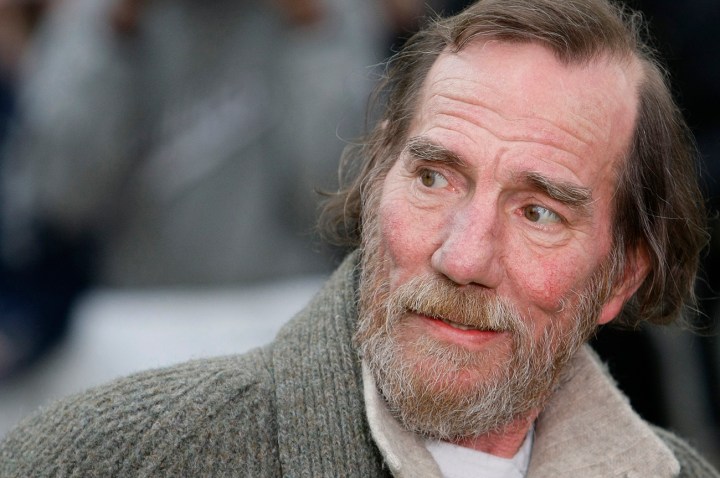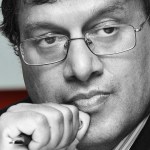Media
RIP: Pete, a humble star

The world lost one of its most under-recognised actors this week. TOBY SHAPSHAK remembers meeting Pete Postlethwaite, a remarkably unassuming man on “Dragonheart” duty in a little town far away.
It was the first so-called historic town in eastern Europe that I encountered. I was travelling west from Turkey, far out on the unfashionable western part of Slovakia, slowly making my way toward Prague. I was a backpacker. It was mid-1994, and it was hot in the European summer.
I had been the only westerner in most of the places in which I had climbed off the bus for the past few weeks – after I had split up with an old varsity friend I’d bumped into in Istanbul, and with whom I had gone to find vampires in Hungary’s Transylvania.
I was walking through a tiny town with a small town square filled with Renaissance-looking houses, bits of Gothic architecture and almost nothing interesting. The guidebook had lied.
I stashed my backpack at the tourist office – amazing how trustworthy you are in a foreign land when you own a mere 15kg of stuff – and was walking down the street when I saw the most unusual of sights. She must’ve been American, I imagined, wearing only the tiniest of cut-off denim shorts and a sports bra. She stuck out like, well, an American tourist. She was walking with an older man, much more demurely dressed. It was mid-afternoon.
So I walked up to them – clearly they weren’t locals – and asked the obvious thing: Is there somewhere to stay here?
Yes, she replied, they were staying in the town’s only hotel. He looked oddly familiar, I thought, when he asked me: “Are you South African?”
I was amazed. In all the years I’ve been travelling, and especially when I was a backpacker, almost nobody had heard of our country, not until the democratic elections anyway, and they usually mistook me for being British or Australian.
He then asked about the elections, what it was like to have lived through apartheid and did I feel proud?
After replying, I bluntly asked: “So, who are you and what are you doing here?”
“We’re working,” she replied.
I burst out laughing, and said working on what?
“We’re making a movie”, she replied, marvelling in the attention with that minor star-attitude of minor fame. I looked a little closer at them – he’d introduced himself as Pete and she was Dina – and realised who he was.
“Is it interesting?” I asked. He laughed.
By that evening, I had found a place to stay (an Alpine camp site with wooden log cabins on rolling green hills that reminded me of the TV show “Heidi” from my childhood) and walked on to the movie set and got a job. I walked through several layers of security with my best clipboard-attitude and convinced the production manager to hire me (I’ll never know what convinced me to foolishly say: “You’ll have to shoot me to get rid of me”, but it worked). Just as he was staring at me confusedly, the assistant director, who I had met in the town square earlier, walked past and said: “Hey it’s you. Put him in my department”. My two-week stint on a Hollywood movie set had begun.
Watch: Pete Postlethwaite on The Age of Stupid
I was a lowly runner. I got a walkie-talkie and a call sheet. No-one quite knew what to do with me. I was an outsider among a bunch of outsiders in a foreign country.
Part of my job was to look after Pete Postlethwaite, the “Pete” of first introduction, who died this week of cancer aged 64. It wasn’t taxing work: Call him from his trailer, get him to where the shooting was, stand around when the camera was rolling and prevent people from walking onto set. And talk to Postlethwaite, who was anything but a typical Hollywood movie star. He was humble, intelligent, thoughtful, well-read and curious. He asked me a lot about South Africa, about Mandela.
In contrast to the other big name stars – especially Dennis Quaid – on the film, called “Dragonheart” (the one with the CGI dragon voiced by Sean Connery), he was a normal person, if an unusually knowledgeable one.
As is the tradition of backpacker lodges, I had picked up a compilation of French playwright Jean Genet’s works and left the books I’d read in trade. He saw me reading it one afternoon and asked me what I thought of Genet, who I had only just discovered. Having finished my degree in journalism and English literature two years before, I was still partly convinced I wanted to study literature for the rest of my life.
We had a number of conversations about literature, the world, geo-politics.
I was instructed never to start a conversation with any of the actors, which included David Thewlis (who gave a command performance in a dark indie film called “Naked” I’d seen just before leaving London the previous year) and Mr Connery.
But Postlethwaite, who was curious about South Africa, would engage me, striking up a conversation during his breaks.
When his family came on set, he was concerned that his young son was looked after, so I did some baby-sitting. He was a mensch. A normal person who spoke to everyone else like normal people. He had neither airs nor graces, was self-effacing and down to earth.
This was the man Steven Spielberg called “the best actor in the world”. He was amazingly unlucky not to get a best supporting actor Oscar in 1993, for a masterful performance in “In the Name of the Father”.
He’s known for other great films such as “The Usual Suspects” (1995) and “Romeo + Juliet” (1996); and last year appeared in sci-fi thriller “Inception” and Ben Affleck’s armed-robbery flick “The Town”. His final film will be “Killing Bono”, due out next year, another Irish-themed film about the rise of U2’s frontman.
Despite his unassuming off-screen demeanour, Postlethwaite was able to deliver performances of extraordinary intensity.
“Dragonheart”, a fantasy story about a medieval knight’s strange drifter relationship with a dragon and the inevitable duel with the evil king, was hardly his best work. But it was an early directorial jig for Rob Cohen, his first big-budget movie, I was told. He would make his name with bigger-budget action flicks and direct Vin Diesel in “Triple X” and “The Fast and The Furious” as well as “Dragon: The Bruce Lee Story”.
“Dragonheart” used a lot of computer-generated graphics and was even nominated for an Oscar for Best Effects, Visual Effects in 1997. It won a Saturn Award for Best Fantasy Film the same year.
There was much excitement, I remember, about using this new CG technology – as there was that Quaid’s more high-profile wife, Meg Ryan, might visit him on set. For accuracy and so he would be looking into the dragon’s eyes, Quaid would speak to bright orange tennis balls on the end of long poles. A group of locals, dressed up as medieval villagers, stared in amazement during filming.
Dina Meyer, whose out-of-context outfit caught my eye in the first place, would remain a B-grade actress whose other notable roles were in “Starship Troopers”, the hideous “Saw” horror flicks and opposite Keanu Reeves in “Johnny Mnemonic”, having started out on the “Beverly Hills, 90210” TV series.
I was an oddity on the movie set. I wasn’t there for career advancement or the money. Just the adventure, the experience. I was asked over and over at meals or drinks after work why I was there and what I was doing. And they were all also bemused that I worked for free (my initial offer to get myself on the set that first night). It was to be my only work experience in the film industry, but ironically my vampire-hunting friend with whom I’d split up just before, Gavin Greenstone, would go on to a career on such sets.
Not just the experience, it was something to see the world’s greatest propaganda machine in operation. And, forget Cosatu, this was the most unionised thing I’ve ever seen. There was a rigid way of doing things with roles cast in stone. Once I helped the assistant focus-puller carry pretty heavy canisters of film and equipment when he walked past me struggling with them. No-one else would do what wasn’t in their job description. He had spent several years doing menial chores, in spite of his university degree, and would spend another five to 10 years working his way up the food chain to cameraman, if I remember correctly.
Eventually, the exciting world of the Hollywood movie set grew, well, repetitive. I packed up and headed off to Prague, the home of one of my literary heroes, Franz Kafka. The only actor who said goodbye to me was Postlethwaite.
Rest in peace, Pete Postlethwaite, a humble star with enormous acting talent. DM
Read more: The New York Times on Pete Postlethwaite.
Photo: Pete Postlethwaite arrives for the world premiere of “The Age of Stupid” in Leicester Square in London March 15, 2009. British filmmakers hosted the world’s first entirely eco-friendly film premiere on Sunday as they rolled out the green carpet for “The Age of Stupid” — a film about a future world devastated by climate change. Stars arrived by solar car, bicycle, or rickshaw and the carpet on which they posed for paparazzi was green, not red. REUTERS/Stefan Wermuth
END NOTE: Shapshak, editor of Stuff magazine, has written film reviews for the Mail & Guardian and Sunday Independent newspapers.














